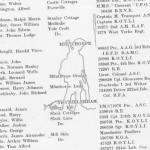When searching through volumes of parish registers – yes, in the days when you actually could look through the registers, I remember coming across many titles as christian names. My initial thought, as a beginner in family history, was wow! Someone of note in my tree. Yes, that feeling lasted only a few short weeks until I realised that many parents gave their children such names as Squire, Baron, Duke and Earl. The girls were also given titles as their first name for example, Lady and Princess. A search of one of the census found one young lady was named ‘Lady May Mafeking Pretoria Barnes Smith’. What had been happening around the time of her birth to warrant her names?
Before we learn a little more about Lady May, I looked in the 1901 census for Squire Ramsden and within a small area there are 5 men with that name ranging in ages from late 50’s to teens.
Leading up to the time of Lady May’s birth, Britain and her forces were fighting in South Africa. Mafeking was one of the most famous British actions in the Second Boar War (Oct. 1899- May 1900), most of us have heard of the Relief of Mafeking. Pretoria, the city surrendered to the British in June of 1900 – all this was happening at the time that little Lady May was getting ready to come into the world.
Well, who is Lady May ? Firstly, as in my previous post, her name has been mis-transcribed – What’s new ? In the 1901 census Lady May can be found on the index as ‘Lady May Magekins’ aged 10 months (being registered in the June Qtr of 1900) and her parents are James Barnes and his wife Annie. James and his wife also fell fowl of a mis-transcription – there names should be James Barnes Smith and Annie Barnes Smith.
James, born and living in Hull was a bird dealer, while his wife was born in Cardiff. The family in 1901 was as follows :-
| Pretons Barner Magekins |
As you can see Lady May has been transcribed over two lines and totally wrong and with her name being rather wrong the second part of her name, has given the impression of a separate person- that is until you look at the actual document.
To follow Lady May in the 1911 census I came up with nothing, but that did not dishearten me aswell, it could end up as anything in the transcription. After trying to find her brother Christmas in the 1911 and other siblings I tried Freebmd for a death and sadly found that she had died aged 3 years old and the transcribers have cross referenced her with both Barnes and Smith :-
| BARNES | Lady May M P S | 3 | Hull | 9d | 167 | |
| Smith-Barnes | Lady M M P | 3 | Hull | 9d | 157 |
It makes me wonder how many other people relatives have been wrongly transcribed giving them no chance of being found. I know the number will be huge and would be fascinated to learn of the unusual or funny ways these names have been transcribed and placed in the on-line indexes – Let me know and I’ll post them here.
Note: The Second Boar War brought Baden-Powell to the fore and Winston Churchill was taken prisoner and held in Pretoria but escaped.
Sources – Wikipedia, Ancestry, FreeBMD
